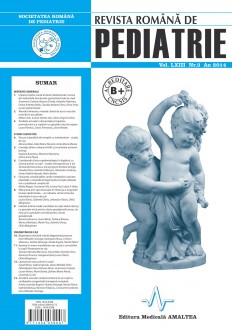SELECT ISSUE

Indexed

| |

|
|
|
| |
|
|
|

|
|
|
|
|
|
|
HIGHLIGHTS
National Awards “Science and Research”
NEW! RJP has announced the annually National Award for "Science and Research" for the best scientific articles published throughout the year in the official journal.
Read the Recommendations for the Conduct, Reporting, Editing, and Publication of Scholarly work in Medical Journals.
The published medical research literature is a global public good. Medical journal editors have a social responsibility to promote global health by publishing, whenever possible, research that furthers health worldwide.
THE EVALUATION OF OBESITY-RELATED CARDIOMETABOLIC DISEASES: A SIMPLE ANTHROPOMETRIC TOOL FOR A COMPLICATED MATTER
Mirela Mogoi, Constantin Ilie, Corina Paul and Iulian P. Velea
ABSTRACT
Introduction. Anthropometric measurements are simple clinical tools that can be used for the evaluation of obesity-related cardiometabolic complications.
Objective. To identify obesity-related cardiometabolic outcomes and to compare the relevance of BMI or WHtR for early diagnosis in a group of obese children and adolescents.
Material and methods. The study included 174 children diagnosed with simple obesity during a three year period. Anthropometric measurements (including BMI and WHtR) and biochemical variables were analyzed.
Results. 4.28% of children were overweight, 31.43% were obese and 64.29% had extreme obesity. The main cardiometabolic complication was insulin resistance (47.76%) followed by hyperinsulinism, alteration of the lipid metabolism and hypertension. All children had a WHtR ≥ 0.5. One Way ANOVA with post-hoc t-test analysis was used for the comparative evaluation of the BMI and WHtR; there were no statistic significant differences between groups.
Conclusion. Obesity defined by BMI and a WHtR ≥ 0.5 is in the majority of cases associated with adverse cardiometabolic outcomes. Both anthropometric indexes should be used as evaluation tools in medical practice, but WHtR has some important advantages.
Keywords: child obesity, body mass index, waist to height ratio, obesity related cardiometabolic disease
